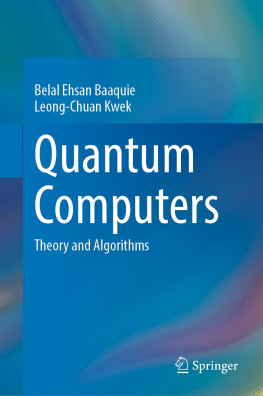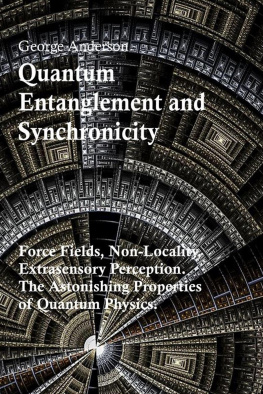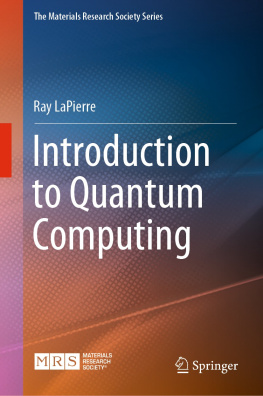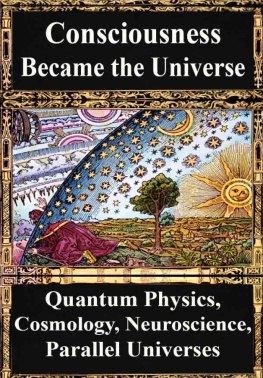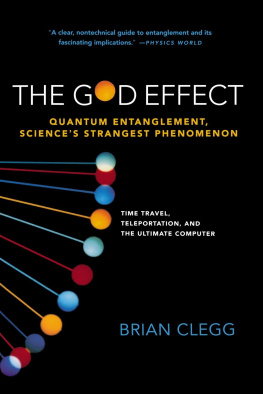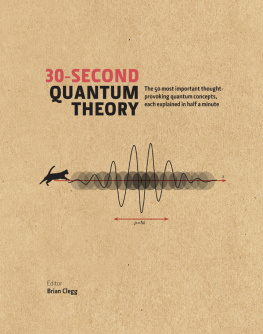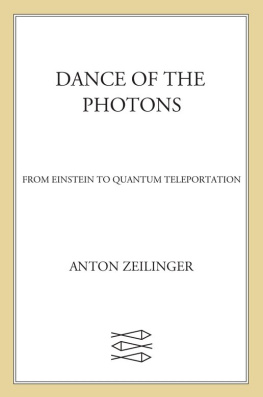Jed Brody - Quantum Entanglement
Here you can read online Jed Brody - Quantum Entanglement full text of the book (entire story) in english for free. Download pdf and epub, get meaning, cover and reviews about this ebook. year: 2020, publisher: MIT Press, genre: Children. Description of the work, (preface) as well as reviews are available. Best literature library LitArk.com created for fans of good reading and offers a wide selection of genres:
Romance novel
Science fiction
Adventure
Detective
Science
History
Home and family
Prose
Art
Politics
Computer
Non-fiction
Religion
Business
Children
Humor
Choose a favorite category and find really read worthwhile books. Enjoy immersion in the world of imagination, feel the emotions of the characters or learn something new for yourself, make an fascinating discovery.

Quantum Entanglement: summary, description and annotation
We offer to read an annotation, description, summary or preface (depends on what the author of the book "Quantum Entanglement" wrote himself). If you haven't found the necessary information about the book — write in the comments, we will try to find it.
Quantum Entanglement — read online for free the complete book (whole text) full work
Below is the text of the book, divided by pages. System saving the place of the last page read, allows you to conveniently read the book "Quantum Entanglement" online for free, without having to search again every time where you left off. Put a bookmark, and you can go to the page where you finished reading at any time.
Font size:
Interval:
Bookmark:
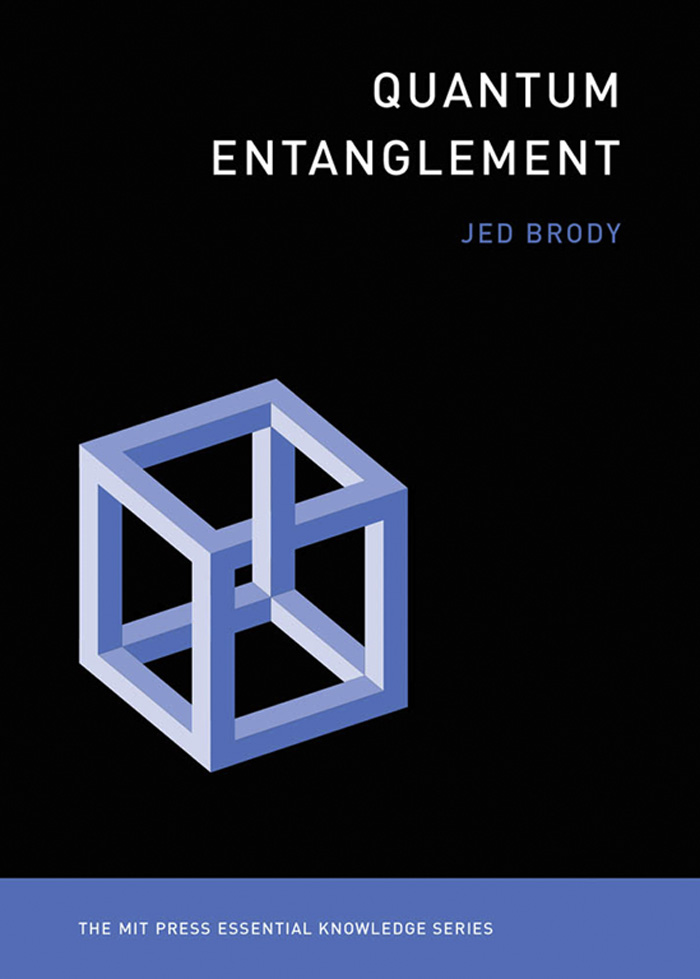
The MIT Press Essential Knowledge Series
A complete list of the titles in this series appears at the back of this book.
Jed Brody
The MIT Press | Cambridge, Massachusetts | London, England
2020 Massachusetts Institute of Technology
All rights reserved. No part of this book may be reproduced in any form by any electronic or mechanical means (including photocopying, recording, or information storage and retrieval) without permission in writing from the publisher.
This book was set in Chaparral Pro by Toppan Best-set Premedia Limited.
Library of Congress Cataloging-in-Publication Data
Names: Brody, Jed, author.
Title: Quantum entanglement / Jed Brody.
Description: Cambridge, Massachusetts : The MIT Press, [2020] | Series: The
MIT press essential knowledge series | Includes bibliographical references
and index.
Identifiers: LCCN 2019024770 | ISBN 9780262538442 (paperback) |
ISBN 9780262357616 (ebook)
Subjects: LCSH: Quantum entanglement.
Classification: LCC QC174.17.E58 B76 2020 | DDC 539.7/25--dc23
LC record available at https://lccn.loc.gov/2019024770
10 9 8 7 6 5 4 3 2 1
d_r0
The MIT Press Essential Knowledge series offers accessible, concise, beautifully produced pocket-sized books on topics of current interest. Written by leading thinkers, the books in this series deliver expert overviews of subjects that range from the cultural and the historical to the scientific and the technical.
In todays era of instant information gratification, we have ready access to opinions, rationalizations, and superficial descriptions. Much harder to come by is the foundational knowledge that informs a principled understanding of the world. Essential Knowledge books fill that need. Synthesizing specialized subject matter for nonspecialists and engaging critical topics through fundamentals, each of these compact volumes offers readers a point of access to complex ideas.
Bruce Tidor
Professor of Biological Engineering and Computer Science
Massachusetts Institute of Technology
I read The Tao of Physics in high school, and it left me hungry to understand the mathematical rigor that inspired mystical statements about quantum physics. I was equally unsatisfied in college physics courses, which had plenty of mathematical rigor but no mystical statements whatsoever. I wrote a term paper about quantum entanglement, which is mysterious if not quite mystical. While working on the term paper, I read classic articles about entanglement, but the information sank into my mind no further than the level that handles paraphrasing.
One reason I didnt understand quantum entanglement is that I had never done an experiment with entangled particles. Indeed, the laboratory is the place where abstract concepts crystallize into palpable significance between your hands. The laboratory is where nature answers the questions posed by theorists. Its impractical, however, for every interested person to do every interesting experiment. Now that Ive done experiments with entangled particles, I hope Im able to explain the phenomenon to anyone whos curious.
Physics lab instructors sometimes feel the need to justify their existenceour existence. We insist that laboratory education is illuminating in ways that can never be fully conveyed in the lecture hall. Gesturing wildly for emphasis, we lavish praise on instructional experiments. Lab teaches hands-on skills and proves that physics actually works. Direct experience with an experiment gets you to think about the underlying physics more than anything else does. Certainly, doing experiments with entangled particles intensified my fascination with quantum mysteries. And I never would have done the experiments without the assistance and encouragement of several organizations and individuals.
Teaching physics lab isnt nerdy enough, so every three years physics lab instructors come together to learn from one another, and generally geek out, at a conference organized by the Advanced Laboratory Physics Association (ALPhA). In summer 2012, the lab conference happened to be in Philadelphia when I was there anyway, visiting my parents. If the conference had been anywhere else, I probably wouldnt have gone. I guard my summer vacation as greedily as Gollum guards the ring. I decided to go to the conference only because it practically arrived at my door. It almost would have been more effort to avoid going.
I expected to feel a bit disgruntled about being at the conference. Although I genuinely enjoy physics, I enjoy vacation even more. To my amazement, the conference was as enjoyable as a vacation. The talks and workshops were illuminating and inspiring. At that conference, I learned about the entanglement experiments for instructional labs. I also learned that ALPhA sponsors three-day immersions to teach instructors how to set up the experiment. In summer 2015, I attended the immersion led by Professor Enrique Galvez at Colgate University. I think I learned more physics in those three days than in any other three-day interval in my life.
After completing an immersion, instructors are eligible to apply to the Jonathan F. Reichert Foundation for a grant to help purchase the lab equipment. Im grateful for the assistance that the Reichert Foundation provided for my instructional lab. The Emory physics department, where I work, covered the rest of the cost.
The final catalyst for this book was Emorys Interdisciplinary Exploration and Scholarship (IDEAS) program, which organizes sidecar courses, each of them geared to explore a topic that intersects with (and is cosponsored by) two existing courses in different departments. I wanted to teach a sidecar course about quantum entanglement. I expected it to be cosponsored by my Advanced Lab course and a philosophy course. But I couldnt find any philosophy professors who were interested. Luckily, I found a willing collaborator in the English department: Dave Fisher, who was scheduled to teach Technical Writing. We created a sidecar course to examine the different ways people write about quantum entanglement. If I hadnt delved into the existing literature to prepare for the sidecar course, I never would have thought to write this book.
Erin Bonning, Michael Weissman, Alissa Bans, and Tom Bing generously read and commented on a draft of this book. Im grateful for additional helpful discussions with colleagues, especially Sergei Urazhdin, Daniel Weissman, Keith Berland, Vincent Huynh, Luiz Santos, Ajit Srivastava, and Justin Burton. I take full responsibility, however, for any errors or imprecision.
Albert Einstein memorably described quantum entanglement as spooky action at a distance. I recall another memorable Einstein quote, this one from a letter he wrote to the philosopher Erik Gutkind in 1954. There Einstein explained his view that the scientists religious feeling takes the form of a rapturous amazement at the harmony of natural law, which reveals an intelligence of such superiority that, compared with it, all the systemic thinking and acting of human beings is an utterly insignificant reflection. In a book about physics, it may be irrelevant to observe that the rapturous harmony of the natural world is increasingly imperiled. And yet, I dedicate this book to the preservation and restoration of the natural world.
Quantum physics describes the behavior (and misbehavior) of tiny things: atoms, photons, and electrons, to name a few. What electrons lack in size, they make up for in importance. Electrons are the glue in chemical bonds, so quantum physics is used to understand the chemical bonds that hold together metals, plastics, skin, and every other material. Electrons are the lifeblood of computer chips, for instance, so engineers use quantum physics to design faster, smaller devices. Wherever quantum physics is applied, its unerringly accurate.
Next pageFont size:
Interval:
Bookmark:
Similar books «Quantum Entanglement»
Look at similar books to Quantum Entanglement. We have selected literature similar in name and meaning in the hope of providing readers with more options to find new, interesting, not yet read works.
Discussion, reviews of the book Quantum Entanglement and just readers' own opinions. Leave your comments, write what you think about the work, its meaning or the main characters. Specify what exactly you liked and what you didn't like, and why you think so.

